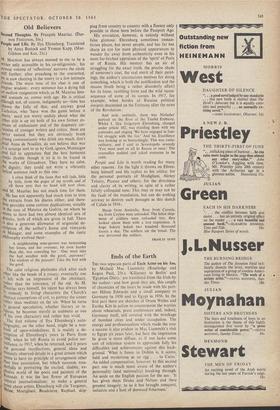Old Believers
Second Thoughts. By Francois Mauriac. (Dar- wen Finlayson, 16s.) M. MAURIAC has always seemed to me to be a Writer only accessible to his co-religionists: his newest volume of 'reflections' narrows the circle still further; after preaching to the converted, he is now chatting in the vestry to a few intimate friends. The main tone of his chat is one of elegiac wisdom: every sentence has a dying fall of mellow resignation which, as M. Mauriac him- self reminds us, comes with age. He is critical (though not, of course, indignantly so—time has shown the folly of that, and anyway good Catholics, who 'have won the game before it starts,' need not worry unduly about what the other side is up to) both of his own former ex- cesses of enthusiasm and of the dogmatic cer- tainties of younger writers and critics; these are never named, but they are obviously brash Young communisants who drink too much, don't read Anna de Noailles, do not believe that war is a scourge sent to us by God, ignore,Montaigne and fail to appreciate that the best humanist credo (feeble though it is) is to be found in the works of Giraudoux. They have no calm, ;10 dignity; they could not write a vibrantly lyrical sentence such as this one: I often think of the faces that will fade, little by little, from the pages of my novels and of all those eyes that no hand will ever close, and M. Mauriac has not much time for them. , lie has not apparently had much time to trim the extracts from his diaries either, and there- fore provides some curious duplications, notably in the case of Maurice du Gudrin, on whom he 'seems to have had two almost identical sets of ensees, both of which are given in full. There Os also a generous allowance of seignorial de- l'scription of the author's house and vineyards 1'4 Malagar, and some examples of the rustic ',Philosophy evolved there:
A neighbouring wine-grower was bemoaning
her losses, and her overseer, hit even harder than she, was consoling her: 'One must take the bad weather with the good, patronne!' The wisdom of the peasant! Take the bad with the good.
The calm religious platitudes click after each other like the beads of a rosary; eventually one is left with an impression of the obstinacy, rather than the tolerance, of the olcl. As M. 'iauriac says himself, his talent has always been fU embody in living- characters the Church's abstract conceptions of evil, to portray the sinner rather than meditate on the sin. When he turns it9 general speculation, whether literary or re- lgious, he becomes merely as stubborn as one Of his own characters and rather less vivid.
The first volume of Ilya Ehrenburg's auto- Lulography, on the other hand, might be a text- tiook of open-mindedness. It is mainly a de- scription of Ehrenburg's years in Paris from 19D8 when he left Russia to avoid police sur- veillance, to 1917, when he returned, and it pours °Ut personal recollections, general ideas and minutely observed details in a great stream which seems to have no principle of arrangement other than free association, but which succeeds won- 'erfUlly in portraying the excited, shabby, ex- 1 )osive world of the poets and painters of the 1 otonde. It was the last flower of European cultural internationalism: to make a general 10int about artists, Ehrenburg will cite Turgenev, seine, Modigliani, Baudelaire, Raphael, skip-
ping from country to country with a fluency only possible to those born before the Passport Age.
His evocation, however, is entirely without false glamour. Ehrenburg sometimes roman- ticises places, but never people, and has far too sharp an eye for mere physical appearances to wander far away from authenticity even in his most far-fetched appraisals of the 'spirit' of Paris or of Russia. His memoir has an air of struggling for the exact truth, the precise shade of someone's coat, the real merit of their paint- ings, the author's unconscious motives for doing something, which is both the justification and the reason (truth being a rather disorderly affair) for its loose, rambling form and the wild incon- sequence of some of its scenes. In 1917, for example, when hordes of Russian political emigres descended on the Embassy after the news of the Revolution :
And now, suddenly, there was Nicholas' portrait on the floor of the Tsarist Embassy. Whilst I, Ilya Grigoryev Ehrenburg, charged under article 102, was standing there with my comrades and singing 'We have engaged in fate- ful struggle with the foe.' And his Excellency was looking at us beseechingly. This was extra- ordinary, and I said to Sevastopulo severely 'You must send us all to Russia at once.' The counsellor nodded and asked everyone to be calm.
People and Life is worth reading for many other reasons: for the light it throws on Ehren- burg himself and his replies to his critics; for the personal portraits of Modigliani, Alexey Tolstoy, Picasso and others; for the directness and clarity of its writing, in spite of a rather falsely• colloquial tone. This may or may not be the fault of the translation, but can do nothing anyway to destroy such passages as this sketch of Calais in 1916:
Sheep from Australia, flour from Canada, tea from Ceylon were unloaded. The latest ship- ment of soldiers were unloaded too; they looked about them with a lost expression. A huge bakery baked two hundred thousand loaves a day. The soldiers ate the bread. The war devoured the soldiers.
FRANCIS HOPE






































 Previous page
Previous page